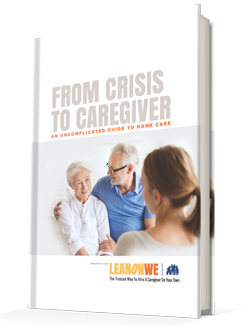Alternatives to Driving: Creative Ways to Help Your Senior Get Around

At some point, a drive out with your aging mother or father becomes a bit more complicated than hopping into the passenger seat.
When that time comes, all the familiar routines of life – running errands, visiting friends, even a trip to the post office – become much more complicated. Yet maintaining these habits is important for your senior’s health and emotional well-being.
Safe transportation is one of the first challenges many families encounter when a senior chooses to age in place. Fortunately, you have options. In this guide, we’ll share tips and resources to help your senior get around.
» Download our free guide to home care, "From Crisis to Caregiver."
Your Senior Still Needs to Get Around – With or Without a Car
Whether or not you feel comfortable with Mom or Dad jumping behind the wheel, they still need to get around and will need access to reliable and safe transportation for:
- Basic errands
- Doctor or dentist appointments
- Buying groceries
- Visiting friends and family
- Attending religious services
There are options to make things easier. For example, Peapod in the Northeast and upper Midwest or Envoy in California can deliver groceries from local stores. Amazon and other online retailers can make it easy for your senior to have items shipped right to the home on the same day, eliminating the need for last-minute trips to the store.
Still, discussing transportation can be a delicate conversation, especially if your parents wish to continue driving as they age.
To navigate this, we recommend keeping your senior involved in the conversation. By making them active participants in arranging transportation, they can continue to feel independent while also adjusting to safer routines.
There’s much to keep up with when your aging parent stops driving. But together, family, friends, and a caregiver can form the perfect team to help your senior get out of the house, whether for errands, appointments, or fun.
Giving Up Their Car, Not Their Freedom
For many seniors living outside a major city, giving up their car keys feels like losing their independence altogether.
It goes without saying that the topic requires sensitivity but can’t be ignored. You’ll have to decide whether it’s possible for your senior to continue driving at all and, if so, under what conditions. For instance, you can start reducing risk by asking the following questions:
- Will you limit travel to daylight hours?
- Will you restrict them to familiar neighborhoods or low-traffic areas?
- Are highways off-limits?
Or is it time to stop driving altogether? You may want to enlist a doctor’s help to make this decision.
Sometimes, modifying or restricting routines is an easier place to start. If Mom or Dad can still drive, encourage them to run errands and visit friends when traffic is light or reschedule activities to make driving a bit less stressful. You can also offer to drive them or coordinate rides for evening events as needed.
While driving can be a concern for your senior, you don’t have to take their keys away completely or make them feel like they are stuck or overly dependent on you. There are other options available for your senior loved ones to get around safely that we’ll explore next.
Alternative Transportation Options for Seniors
Just because your great aunt had to hand over her keys doesn’t mean she can’t get around as much, or more, than she used to.
There are plenty of alternative forms of transportation to help your senior get around, whether it’s to run errands, head to the doctor, or visit with friends. The top transportation alternatives to consider are:
- Friends and family: This is often the simplest place to start, however, it does put the burden on you and your family. Friends and family in the area can help coordinate rides to get your senior around. This is a helpful way to provide transportation while cutting down on costs, as many of the other options require payment.
- Public transportation: Public transportation is a reliable and affordable way to get around – but only if you live in an area with good public transportation. In the New York metropolitan area, you have many options from trains to buses for travel around the city.
- Paratransit: For those with mobility challenges, paratransit services can provide home pickup and transport in minibusses or small vans to accommodate wheelchairs and other mobility equipment. Seniors can schedule services in advance to ensure timely pickup and dropoff.
- On-demand/ridesharing: Local taxis or Uber/Lyft provide on-demand access to transportation. These can be the most expensive option and will depend on the trip time and distance. If your senior is uncomfortable or unfamiliar with using different ridesharing apps, in some areas, services like GoGoGrandparent may be a good option.
- Local community services: There may be community services for seniors offered by local churches and synagogues or your city’s Department of Aging. You can also check the U.S. Department of Health and Human Services Eldercare Locator to find local resources.
These options are fine if you wish to be involved or if your senior is independent enough to arrange transportation. If, however, they need a bit of extra help, that requires someone to be there in person for them and hiring a caregiver is one of the best ways to help them.
Hire a Caregiver to Help Your Senior Get Around
If public transportation feels unreliable but you and your family do not have the time or resources to provide transportation for your senior, a caregiver is an excellent option.
Hiring a caregiver allows your loved one to age at home and stick to routines, freeing you up from the full responsibility of caring for your parent. A caregiver can help with the following:
- Driving your senior to and from the doctor and other appointments
- Taking your senior out for activities
- Assisting with or supervising showers
- Cooking meals
- Helping with laundry and light housekeeping
At LeanOnWe, we specialize in helping families hire privately through a vetted network of professional, highly recommended caregivers. If you have never hired a caregiver before or had a bad experience with a traditional agency and wish to learn more about hiring privately, we invite you to download the free care guide at the end of this article.
Looking for Homecare? Download Our Free Homecare Guide
If the thought of hiring a caregiver makes you feel overwhelmed, we recommend downloading our free eBook, “From Crisis to Caregiver: An Uncomplicated Guide to Home Care.”
This eBook discusses the ins and outs of hiring a caregiver, arming you with a trustworthy resource to make the best decision for your loved one. Our eBook takes a no-nonsense look at:
- The realities of financing senior care.
- Straight talk about the pros and cons of the three common care options.
- Our own stories of hiring caregivers as a way to highlight the unexpected pitfalls you’ll want to avoid.
After reading “From Crisis to Caregiver,” you’ll know how to find and hire a caregiver on your own but still have access to services you wouldn’t normally have with a private caregiver, such as backup help and expert advice. Most importantly, you’ll be able to approach the process with confidence and peace of mind.

